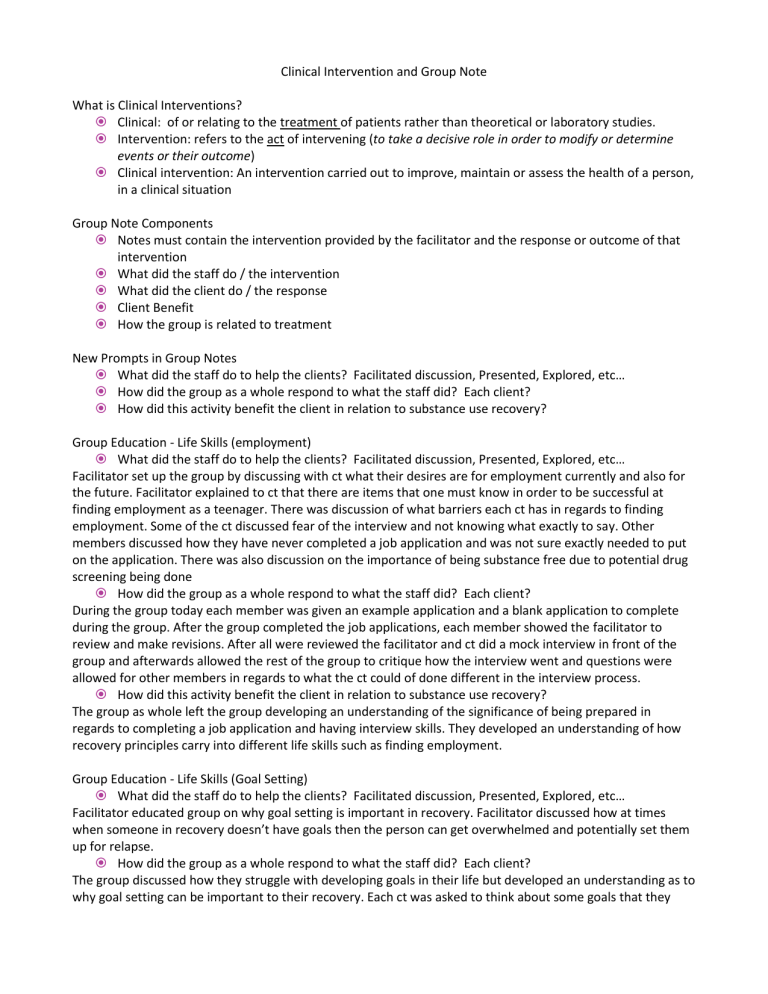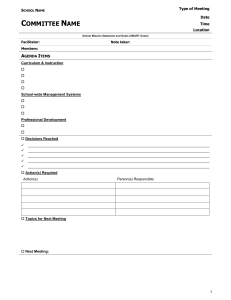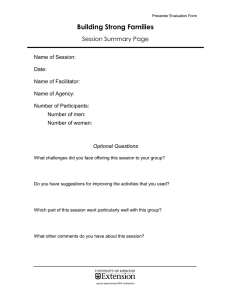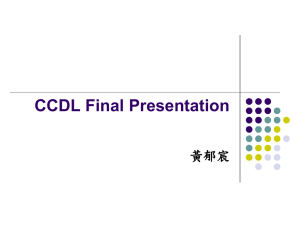
Clinical Intervention and Group Note What is Clinical Interventions? Clinical: of or relating to the treatment of patients rather than theoretical or laboratory studies. Intervention: refers to the act of intervening (to take a decisive role in order to modify or determine events or their outcome) Clinical intervention: An intervention carried out to improve, maintain or assess the health of a person, in a clinical situation Group Note Components Notes must contain the intervention provided by the facilitator and the response or outcome of that intervention What did the staff do / the intervention What did the client do / the response Client Benefit How the group is related to treatment New Prompts in Group Notes What did the staff do to help the clients? Facilitated discussion, Presented, Explored, etc… How did the group as a whole respond to what the staff did? Each client? How did this activity benefit the client in relation to substance use recovery? Group Education - Life Skills (employment) What did the staff do to help the clients? Facilitated discussion, Presented, Explored, etc… Facilitator set up the group by discussing with ct what their desires are for employment currently and also for the future. Facilitator explained to ct that there are items that one must know in order to be successful at finding employment as a teenager. There was discussion of what barriers each ct has in regards to finding employment. Some of the ct discussed fear of the interview and not knowing what exactly to say. Other members discussed how they have never completed a job application and was not sure exactly needed to put on the application. There was also discussion on the importance of being substance free due to potential drug screening being done How did the group as a whole respond to what the staff did? Each client? During the group today each member was given an example application and a blank application to complete during the group. After the group completed the job applications, each member showed the facilitator to review and make revisions. After all were reviewed the facilitator and ct did a mock interview in front of the group and afterwards allowed the rest of the group to critique how the interview went and questions were allowed for other members in regards to what the ct could of done different in the interview process. How did this activity benefit the client in relation to substance use recovery? The group as whole left the group developing an understanding of the significance of being prepared in regards to completing a job application and having interview skills. They developed an understanding of how recovery principles carry into different life skills such as finding employment. Group Education - Life Skills (Goal Setting) What did the staff do to help the clients? Facilitated discussion, Presented, Explored, etc… Facilitator educated group on why goal setting is important in recovery. Facilitator discussed how at times when someone in recovery doesn’t have goals then the person can get overwhelmed and potentially set them up for relapse. How did the group as a whole respond to what the staff did? Each client? The group discussed how they struggle with developing goals in their life but developed an understanding as to why goal setting can be important to their recovery. Each ct was asked to think about some goals that they developed and achieved. They were then asked to write out a long and short term goal to think about for their future. How did this activity benefit the client in relation to substance use recovery? The group was influential in helping the ct understand that without having goals in their life that they could potentially set them up for relapse because of stress and being overwhelmed without having a purpose in their life. Group counseling - Relapse Prevention What did the staff do to help the clients? Facilitated discussion, Presented, Explored, etc… Facilitator processed with ct in a group setting why development of positive activities in their lives are important for ongoing recovery. Facilitator processed why boredom could be a trigger for relapse, by engaging the group in discussion on how boredom has impacted them since they have stopped using. How did the group as a whole respond to what the staff did? Each client? The facilitator allowed for open discussion from each client on times in their recovery they have felt bored and what feelings they experienced during these times. Ct A stated that he has been bored during his recovery and he felt anxious about this and had thoughts of using during these times. Ct B stated that he has engaged in new activities that he did not realize that he enjoyed such as attending his youth group and developing new positive friendships. Overall the cts were engaged in the group and had stated that they realized that boredom is one of their top triggers. How did this activity benefit the client in relation to substance use recovery? This group helped cts to express how they feel about being in recovery and how boredom can bring forth more emotions than they realized. They were able to share with each other different ideas that were positive that they have used to help them with times of boredom. Structured Activity - Recreation What did the staff do to help the clients? Facilitated discussion, Presented, Explored, etc… Staff coached the client through the exercises and gave tips on staying healthy. How did the group as a whole respond to what the staff did? Each client? The client completed various exercises such as; jumping jacks, sit-ups, push-ups, etc. The client responded by saying they enjoy this group and it helps them relieve stress. How did this activity benefit the client in relation to substance use recovery? This relates to recovery because it give the client a different way use their time constructively. Structured Activity - Community Service What did the staff do to help the clients? Facilitated discussion, Presented, Explored, etc… Staff assisted client in identifying how the work they completed today assists the less fortunate in the area and the skills they learned could be used for seeking employment in retail. How did the group as a whole respond to what the staff did? Each client? The client attended community service at the Salvation Army where they cleaned the windows and mirrors, organized clothes, vacuumed etc. The client responded by saying this group gives them time to give back to the community in a positive way. How did this activity benefit the client in relation to substance use recovery? This relates to recovery by giving the client time outside of the facility so they can focus on the optimistic aspects to help complete their treatment. Group Note Checklist What did you as the staff do during the group? How did the clients respond? How did the group benefit the client’s recovery/treatment? Structure Activity based groups are great but the summary must show what the facilitator did, what the clients did, AND how the activity benefited the clients with regard to their recovery


